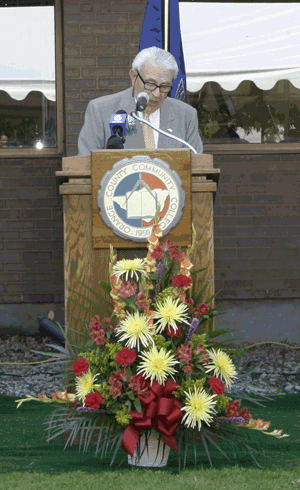The Gilman Center for International Education
SUNY Orange’s Gilman Center for International Education provides a sparkling home for the College’s Global Studies programs and serves as a fitting tribute to Benjamin A. Gilman, a longtime Congressman and revered public servant known internationally for his compassion, advocacy for human rights and artful ability to build relationships across cultural, economic, language and religious barriers.
The Center encompasses nearly 5,000 square feet of space, blending new construction with interior renovation of existing space.
A sizeable portion of the Gilman Center was carved from the College’s Library. Interior renovations to the Library included a large 1,800 square-foot lecture room/classroom space with the capacity to hold more than 250 occupants, installation of the latest technological equipment to accommodate presentations, and movable furniture to allow for a variety of configurations. Renovations also included a large open space where students can gather in small discussion groups or find a quiet spot for individual study. The Center is also associated with an international lecture series.
Throughout the Gilman Center’s interior, suitable spaces are allocated to showcase research papers, artwork, memorabilia and other items from Gilman’s more than 30 years in Washington, as well as his travels abroad. International studies and global understanding were cornerstones of Gilman’s career in government, and they also create the foundation for the mission of the Gilman Center.
The beautiful glass and aluminum entryway along the building’s south exterior gives the Library a glistening façade facing Harriman Hall. The 900-square-foot entryway features a circular foyer and a reception desk, and includes an open floor plan suitable for receptions and gatherings. Outside, a circular promenade, a nearby patio and landscaping accent the entryway.
The focal point of the Center’s impressive exterior is a ring of flagpoles that surround the entryway, with each flagpole carrying the colors of a country in which Gilman served or helped foster strong international relations on behalf of the United States during his career.
During construction of the Gilman Center for International Education, six exterior flagpoles were positioned to display flags (Ireland, Israel, Italy, Mexico, United Kingdom and United States) chosen to honor Representative Gilman’s service to community, state and nation. Special attention was given to show particular appreciation for his time as chair of the U.S. House of Representatives’ International Relations Committee.
In accordance with the official College Board policy BP2.47 adopted in May 2024, the flags shall continue to be displayed as they were when the Gilman Center was first opened in 2008. That policy also indicates that the Gilman Center flags honor Representative Gilman’s service and they are not intended to symbolize or be viewed as political expression by the College. Displaying the chosen international flags in this context is part of a broader, respectful recognition of Congressman Gilman’s public career—not a reflection of the College’s ideology.
 The Honorable Benjamin A. Gilman
The Honorable Benjamin A. Gilman
December 6, 1922 – December 17, 2016
Benjamin A. Gilman, a longtime Congressman and revered public servant, was known internationally for his compassion, advocacy for human rights, and artful ability to build relationships across cultural, economic, language and religious barriers. He served under seven presidents during a 30-year term that spanned from 1973 to 2003.
For nearly his entire tenure in Washington, Gilman was a member of the House of Representatives’ International Relations Committee. He was the committee’s chair from 1995 to 2002.
He was a recipient of the Distinguished Service Gold Medal, the highest honor bestowed by the State Department. He also served as a public delegate to the United Nation’s U.S. Mission at the request of President George W. Bush.
His lengthy resume of accomplishments, appointments and assignments includes serving as a Congressional delegate to the United Nations under Ambassador Jeane Kirkpatrick in 1981. He was a member of the Ukraine Famine Commission; served on the U.S. European and the U.S. Mexican Interparliamentary conferences; was a Congressional Advisor to the U.N. Law of the Sea Conference; sat as co-chair of the Ad Hoc Committee on Irish Affairs; and participated on the International Task Force on Narcotics.
Through his advocacy of human rights, Gilman brought about numerous "prisoner exchanges," resulting in freedom for prisoners in East Germany, Mozambique, Cuba, the Soviet Union and several other nations. Gilman was the Executive Member of the Human Rights Caucus. During the 101st Congress (1989-91), he was chair of the House Task Force on Emigration of Soviet Jewry. In 1993 he was appointed a member of the U.S. Holocaust Memorial Council and re-appointed in 1997. He was known for championing U.S.-Israel relations and frequently spoke on the importance of democratic partnership in the Middle East.
Gilman was the ranking member on the Government Reform and Oversight Committee. He also co-founded the House Select Committee on Narcotics, was ranking member on that committee (1977-1989) and served as a premier member of that committee until its abolition in February 1993.
Gilman became actively involved in fighting world hunger and malnutrition during the mid-1970s. He authored legislation creating the Presidential Commission Against Hunger, on which he served and subsequently, the Select Committee on World Hunger. A member of the Select Committee on Prisoners of War and Missing in Action in Southeast Asia, from 1975 to 1977, Gilman subsequently served as chair of the Task Force on the issue. He also advocated voraciously for an accounting of our POW's and MIA's to Vietnam, Laos and China.
Gilman, who flew 35 missions over Japan as an aviator during World War II, earned the Distinguished Flying Cross and the Air Medal, with Oak Leaf Clusters.
He served in the New York State Assembly from 1966 to 1972 before being elected to Congress. He was also an assistant attorney general in the state’s Law Department and served as counsel to the State Assembly’s Committee on Local Finance.

